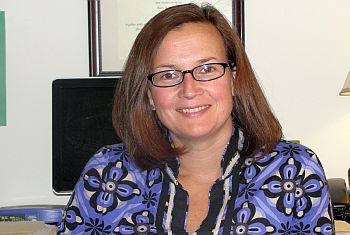 01/12/12 Dr. Carrie Cadwell of Cadwell Psychological Service, LLC held the first in a series of informational presentations for parents of Plymouth Schools students and other community members on January 10. The meeting was held at Menominee Elementary.
01/12/12 Dr. Carrie Cadwell of Cadwell Psychological Service, LLC held the first in a series of informational presentations for parents of Plymouth Schools students and other community members on January 10. The meeting was held at Menominee Elementary.
Cadwell said, “I come to this tonight as a parent and a psychologist.”
Cadwell spoke on the topic “Are Your Kids Sleeping? Pediatric sleep Issues.”.
Cadwell said a study in 2004 by the National Sleep Institute showed that as many of one-third of school age children are getting insufficient sleep. However, more surprising data from the study indicates that as many as 90 percent of parents of school age children think their child is getting enough sleep.
Cadwell said there are more demands on children today. She said, “Poor sleep exacerbates all psychological and medical conditions.” According to Cadwell, lack of sleep is linked to issues with attention, hyperactivity, memory and learning. She said children at age four still need 11.5 hours of sleep each night and should not be taking naps. She went on to say that those ages 5-7 need 11 hours; 8-9 need 10-11 hours; children 10-11 require 10 hours, and teenagers from 12-15 still need 9.5 hours each night.
Cadwell said older teenagers need from 8.5-9.5 hours each night but are getting 7.2, according to studies.
Cadwell said parents should set a consistent bedtime that includes 3-4 quite activities close to bedtime and allow no media/electronics within one hour of bedtime. She said, “They are too stimulating for the brain.” She also suggested that there be no physical activity within an hour of when parents want a child to sleep.
According to Michael Dunn, principal of Menominee, he and Dr. Cadwell began brainstorming ideas of how they could help parents after the topics were mutually brought up during meetings of the Plymouth Schools Improvement Committee.
Dunn said, “Dr. Cadwell is dedicated to this cause. She is an active parent of an elementary-age child and sees first hand what some of our parents are up against.”
Dunn said, “In the world we live in now, kids have to put in extra study time along with fitting in extra-curricular activities and family time.”
He added, “When we were trying to figure out why some kids weren’t reading nor focusing as well as they could, we found that often a lack of sleep was the issue.”
Dr. Cadwell concurred saying, “Many times I find that those I see for problems noted by parents or physicians are actually sleep deprived.”
Other presentations and topics scheduled are as follows: February 9, ADD/ADHD; March 13, Anxiety; and April 5, Autism Spectrum Disorders. All of the presentations will be held from6:00-7:00 p.m.
Dr. Cadwell stressed that parents may be reluctant to attend the sessions because they don’t want others to think their child has a problem; but indicated that this is just a way to gain knowledge. She said, “Parents who generally have more information up front, know what to do if a problem arises.”
Dr. Cadwell has been working in the field of mental health since 1994 and as a licensed psychologist in 2005.
Carol Anders Correspondent














